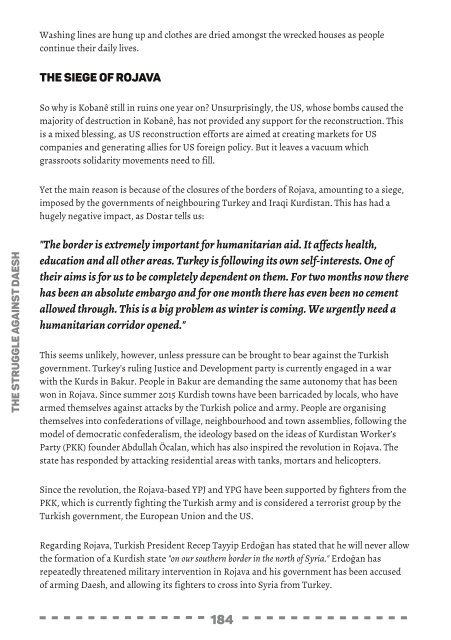STRUGGLES
Struggles-for-autonomy-in-Kurdistan
Struggles-for-autonomy-in-Kurdistan
Create successful ePaper yourself
Turn your PDF publications into a flip-book with our unique Google optimized e-Paper software.
Washing lines are hung up and clothes are dried amongst the wrecked houses as people<br />
continue their daily lives.<br />
The siege of Rojava<br />
So why is Kobanê still in ruins one year on? Unsurprisingly, the US, whose bombs caused the<br />
majority ofdestruction in Kobanê, has not provided any support for the reconstruction. This<br />
is a mixed blessing, as US reconstruction efforts are aimed at creating markets for US<br />
companies and generating allies for US foreign policy. But it leaves a vacuum which<br />
grassroots solidarity movements need to fill.<br />
Yet the main reason is because ofthe closures ofthe borders ofRojava, amounting to a siege,<br />
imposed by the governments ofneighbouring Turkey and Iraqi Kurdistan. This has had a<br />
hugely negative impact, as Dostar tells us:<br />
the struggle against daesh<br />
"The border is extremely important for humanitarian aid. It affects health,<br />
education and all other areas. Turkey is following its own self-interests. One of<br />
their aims is for us to be completely dependent on them. For two months now there<br />
has been an absolute embargo and for one month there has even been no cement<br />
allowed through. This is a big problem as winter is coming. We urgently need a<br />
humanitarian corridor opened."<br />
This seems unlikely, however, unless pressure can be brought to bear against the Turkish<br />
government. Turkey's ruling Justice and Development party is currently engaged in a war<br />
with the Kurds in Bakur. People in Bakur are demanding the same autonomy that has been<br />
won in Rojava. Since summer 2015 Kurdish towns have been barricaded by locals, who have<br />
armed themselves against attacks by the Turkish police and army. People are organising<br />
themselves into confederations ofvillage, neighbourhood and town assemblies, following the<br />
model ofdemocratic confederalism, the ideology based on the ideas ofKurdistan Worker’s<br />
Party (PKK) founder Abdullah Öcalan, which has also inspired the revolution in Rojava. The<br />
state has responded by attacking residential areas with tanks, mortars and helicopters.<br />
Since the revolution, the Rojava-based YPJ and YPG have been supported by fighters from the<br />
PKK, which is currently fighting the Turkish army and is considered a terrorist group by the<br />
Turkish government, the European Union and the US.<br />
Regarding Rojava, Turkish President Recep Tayyip Erdoğan has stated that he will never allow<br />
the formation ofa Kurdish state "on our southern border in the north ofSyria." Erdoğan has<br />
repeatedly threatened military intervention in Rojava and his government has been accused<br />
ofarming Daesh, and allowing its fighters to cross into Syria from Turkey.<br />
184


